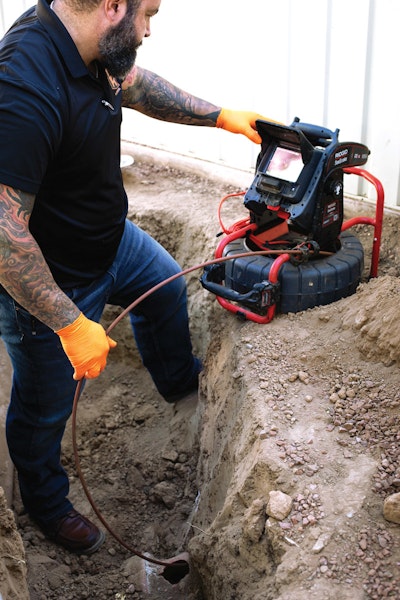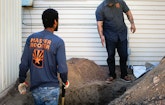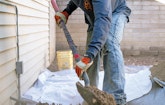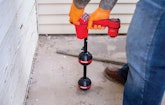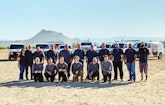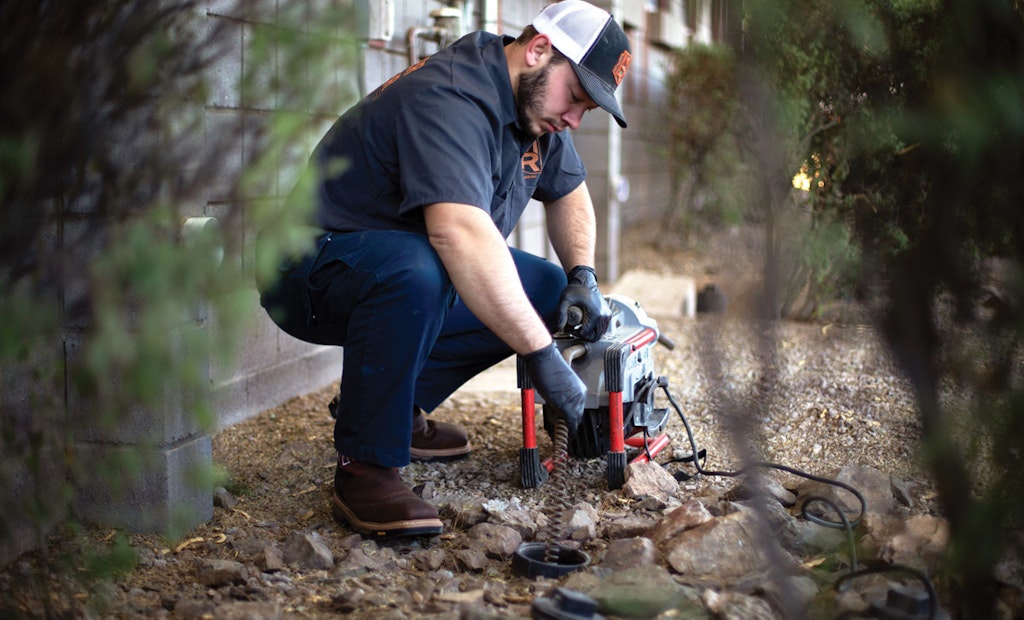
Master Rooter technician Vlad Shelley snakes a residential lateral line with a RIDGID drain cleaning machine.
Interested in Plumbing?
Get Plumbing articles, news and videos right in your inbox! Sign up now.
Plumbing + Get AlertsJason Lohoff had no idea what challenges he would face in his first year of business. With his years of plumbing experience and advice from his father, Lohoff hit the ground running. About six months later, the pandemic hit and he had to make some quick changes in order for his business to survive.
Lohoff opened Master Rooter, his full-service plumbing and drain business in Mesa, Arizona, part of the Phoenix metro area, in mid-2019. His father had been a plumber in the Valley of the Sun and, as a boy, Lohoff had accompanied him on service calls. “I was his first employee,” Lohoff says with a laugh, recalling teenage years assisting in his father’s one-man firm.
Lohoff went on to accumulate a wealth of experience working at other companies, which prepared him to meet unexpected challenges — such as pandemic lockdowns — head on.
Come back stronger
When a drainpipe fails, it either is repaired or replaced and, ultimately, the line is stronger. Lohoff’s first attempt as a young man to open a plumbing house failed when his marriage did. Rather than wallow in professional disappointment, he spent the next decade working for other Phoenix plumbing firms, honing his managerial instincts and building out his skill set as a problem-solver.
“I worked in all the positions, worked all the plumbing jobs,” he recalls of those years. Lohoff helped grow one company from five service vans into one with 18 trucks rolling out the door. At another firm, business volume expanded on his watch — as did truck fleet size, swelling from 12 to 50. From those experiences, Lohoff came away with fundamental ideas about running a plumbing business.
“First of all, plumbing is what we do and we need to know how to do it,” he says, “but how you run the business side of it is so critical. How you treat your employees. How you operate the company overall. I learned not only what to do, I learned what not to do.”
He also became convinced of the truth of some advice shared by his father many years before. “My dad used to tell me that I had better appreciate every customer I have. People tend to think that you don’t have a boss when you are self-employed. In reality, I have thousands of bosses and we try to treat every customer as if he is the owner. Treat your customers right, Dad would say, and you’ll be able to feed the family.”
Finally, in 2019, Lohoff took his accumulated experience and invested it in a new company called Master Rooter. The firm offered plumbing services to residential and light commercial customers. Drain cleaning and repair was the company’s main focus then and remains so today — including replacement of underground lines using pipe bursting technology.
Even for a full-service plumbing company, offering pipe bursting as a plumbing repair option was still somewhat unusual in 2020, but the trenchless industry has growing presence in the market. Lohoff relies on TRIC Tools lateral sewer pipe pipe bursting tools for that work.
His brand-new company also offered natural gas line repair and replacement. That, too, is atypical. “In the Phoenix marketplace, I would say 80% of residential plumbers don’t understand natural gas repair or installation. They don’t understand acceptable pressures and meters, the whole concept,” Lohoff says.
Because gas line work in Phoenix can be undertaken by anyone with a standard plumbing license, the quality of such work is uneven, Lahoff says. “About half of our gas line jobs are going in and fixing handyman-type repairs, including some by other plumbers.”
Cool in a crisis
As 2019 ended, Master Rooter was rolling along. Drain cleaning accounted for about 90% of its workload, with half of that commercial. The future seemed assured. Then the virus arrived and Master Rooter immediately felt its arrival.
“We didn’t see a tremendous slump, but we quickly noticed that, though we could finish commercial jobs we had, new jobs weren’t coming in,” Lohoff says. “Commercial accounts such as restaurants and bars began a quick and steady decline. Some of them even had to close. That meant not only the loss of future revenue but also, when the billing cycle ended, we had to work with clients about getting paid for work done in the previous 90 days.”
But a crisis can turn into opportunity when you keep your head in the game. Lohoff says he reacted quickly. “We didn’t sit on our hands too long. We had to be fairly proactive. Some smaller plumbing shops that were geared toward commercial work went under.”
He responded in two ways. First, Master Rooter re-emphasized its commitment to drain cleaning service in all its forms. It particularly targeted residential customers because COVID-19 was sending people home to work. The company redirected much of its advertising dollars online to create a prominent internet presence when home-bound employees overtaxed their facilities and searched the web for help.
The other initiative occurred about six months ago when the company introduced cured-in-place pipe lining. Instead of shrinking its number of services, it expanded them. And with the addition of Perma-Liner, the company offered a full gamut of solutions for faulty pipelines — spot repair a pipe, burst and replace it, or preserve it with a new felt liner.
Today, about three-quarters of Master Rooter work is drainline-related — clearing, jetting, repairing, replacing or lining. Lohoff expects that to remain the case moving forward. “Drains as an overall category is about right for us. We will continue to reinvest in the company and to grow the volume of work — we’ve seen a change already. But as we grow, I think the percentage of drain work will remain about the same. It’s kind of what we are built for as a company.”
Well equipped
Master Rooter has grown quickly for a relatively new company, and now has 32 employees and 13 service vans. It initially got by cleaning drains with a Spartan Tool 738 jetter, which is a trailer-mounted unit that can pump 12 gpm at 2,000 psi. But a second jetter — the Spartan 758, capable of pumping 12 gpm at 3,000 psi — was purchased in November to keep ahead of jetting demand.
TRIC hydraulic pumps and pulling units for pipe bursting had been available to service techs from the moment the company opened its doors, but now that equipment shares space with the Perma-Liner hydraulic pumps and push, pull and inversion equipment. Other equipment includes four RIDGID SeeSnake cameras, the smallest a Mini with the high dynamic range sensor for clear photos in murky conditions.
The company is light on excavation equipment. There’s a Bobcat skid-steer, but no mini-excavator. Lohoff opts to hand-dig most jobs rather than risk damaging underground utility lines.
The best indicator of the company’s expansion, however, is the October 2020 opening of a new branch facility in north-central Arizona. The Prescott office will serve the Prescott Valley, Dewey-Humboldt, Chino Valley market about 90 minutes north of Phoenix just off Interstate 17. Lohoff says that area is growing.
“It has a lot of new homes going up and it is close enough that it’s feasible to manage it from Phoenix. The market there is underserved, which one of my employees discovered after he bought a cabin, tried to get some plumbing service and found available plumbing companies were booking three and four days out.” Lohoff has three company employees developing the new market.
He cross-trains plumbers to give his staff more flexibility in responding to service calls. The exception to that is pipeline inspections. “The camera work is as much art as science, in my way of thinking. You really have to know how to read the results of an inspection.” Four employees handle camera assignments under the supervision of two senior technicians.
The 41-year-old company owner is pegging his future success on treating his employees fairly. “We work at fostering a good working environment for our employees. We expect a lot of them and try to retain top talent by treating everyone as family. From the newest to the most seasoned, we always try to help each other out. I think that’s a huge key to growing our business the right way.”
Valuing the trades
Successful entrepreneurs are curious, opportunistic and driven. They thrive on finding new ways to do things or leveraging new markets with new products. Jason Lohoff is a textbook entrepreneur.
Lohoff opened Master Rooter in the Phoenix area about 18 months ago, determined to build a new plumbing business in a mature market. The metro area has more than 4 million people who are served by some 128,000 businesses, including more than a few plumbers. No matter. Plumbing is what he wanted to do.
Lohoff’s father was a plumber, too. He advised his son to go to college and work toward landing a high-paying office job instead of following in his footsteps. Lohoff wasn’t keen on the idea. “I grew up in the trade and worked with my dad all the way through high school. I did go to college for a while, but it just didn’t have the attraction for me that I had for plumbing.”
He got a rush from going out on plumbing service calls, interacting with customers and resolving issues. “I like the problem-solving part of it, especially in drain work,” he says. “When there’s a large project that can’t be figured out and requires a true professional take on the situation, I love it. Offering a feasible solution in such a situation is one of my favorite parts of the job.”
Master Rooter recently landed a pipe lining job at a condominium complex with eight buildings. By the terms of the contract, no units were to be shut down longer than 12 hours at a stretch and general disruption of condo residents was to be avoided. “How do you make that happen? That was my challenge and my team is great at being able to do something like that.”
The growth of Master Rooter now requires that Lohoff spend more hours in the office than he prefers, but he still visits larger projects. “I might only be at a site for an hour or two but I want to check in. I gave the quote and came up with a solution and I want to make sure it’s implemented properly,” he says.
Lohoff admits to being passionate about plumbing and believes every young person should be able to follow his or her passion — including into a trade. “I see so many people pushing their kids to go to college when sometimes a kid has no direction when he does. I’m a big proponent of trades and trade schools and validating tradespeople as they used to be valued. It’s a great honor to work in this or many other trades.”
